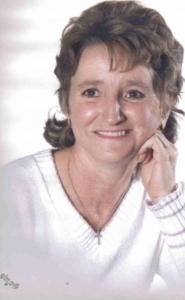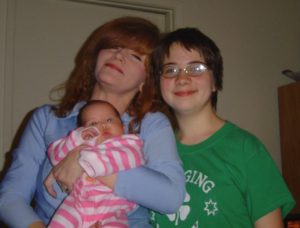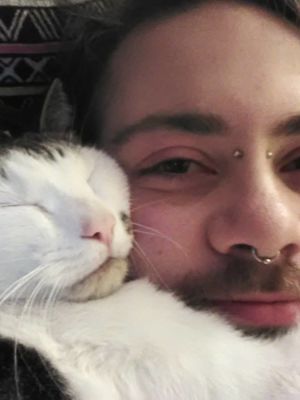Perpetual Summer
As a kid growing up on the asphalt of Los Angeles, I treasured any chance to play outside. My schoolyard was concrete. My various apartment buildings had courtyards with potted plants if we were lucky, or underground parking garages if we weren’t. At my best friend’s house, I was always the one begging the other kids to go play in the backyard. Sometimes, using wooden weapons and old movie props, we would act out the video games they were so reluctant to leave indoors.
Soon after school ended each year, I would pack my backpack and my Barney suitcase. With my mom and my two older siblings, I would board a Greyhound bus and watch the country fly by. Driving through the night, it took about three days to get from Los Angeles to Spartanburg, South Carolina, where we would spend the next three months.
Those summers seemed perpetual. Each morning I would wake up and go outside. My grandparents’ house was on the corner where two winding country roads met. Behind the house at the end of the gravel driveway was Grandpa’s shop, where he played pool in one room and did his work as a machinist in the other. Much of the yard was taken up by an enormous garden where Grandpa grew okra, cucumbers, squash, peppers, cabbage, watermelon, and tomatoes. Beyond the garden were two houses, one with a deck and a pool, the other with chickens in wire cages in the yard. There, two of my mom’s sisters lived with their families. Woods, which seemed impassable to me at the time but were really just a screen to separate us from the neighbors, surrounded the yard and the three houses. I spent most of my time barefoot in the grass of that huge yard, playing with my little cousin. We rode bikes, bounced on the trampoline, and, of course, acted out our favorite video games.

Nanny
All of this was overseen by my mom and her stepmom, who I called Nanny. They would sit on the porch swing by the shop, its benchlike seat in constant motion as they gossiped about the neighbors, who were almost all related to us. Sometimes, darkness didn’t come until 9 p.m. The adults would gather as evening drew down. Grandpa would sometimes light a fire in a big metal barrel by the shop, and we would all sit around it. Other nights we would go into the living room with its blue walls and bright lights. Nanny would watch TV and teach me how to do jigsaw puzzles. I remember the image of her decisively tapping down each puzzle piece into its proper place with a fingernail. She was a pro at puzzles, and she would often glue them, frame them, and hang them on the walls of the house.
As a baby, Nanny had tumors in her ears. Surgery left her able to hear, but her speech was impacted for the rest of her life. She spoke in her own particular language, which those closest to her had no trouble understanding. “I love you” would come out as “Ah huv oo,” sometimes with a little hand motion to make sure her meaning was clear. Everyone got nicknames that she could pronounce—except me, because before I was born, she helped choose a name for me that she would be able to say. When I was talking to her and got really stumped, she would holler for my mom or grandpa, who would stick their head in the room and translate her language for me.
When I was ten, my family moved to South Carolina for a single year. Across the street from the big yard with the three houses, a doublewide trailer was available. I was concerned with little beyond starting a new school, making friends, and spending as much time outside as possible. I found a special place in the yard behind the trailer, a hidden spot beneath a tall tree with low branches. There, I could feel magic emanating from the earth. It was just enough wilderness for me, the city kid. I built up screens of fallen branches for privacy, and I tied up an old tire to make my own swing. I took my favorite books up into the tree and spent hours nestled in the branches, reading. I burrowed into my books about magic and lady knights, and I entrenched myself in the multitudes of worlds they encompassed. I began writing my own stories about werewolves and kids and cities and magic.
That was the year I started to become aware of things in the adult world that were grim and serious. Being on the east coast, I was in school when the planes crashed in New York on 9/11. The teacher turned on the news in the classroom, but I had no idea what it meant. I felt no real shock or worry until I saw how my mom reacted. After that, the world seemed to take on a darkness. Fear and anger permeated the air. Around the same time, a neighbor and relative was shot and killed in a hunting accident. I answered the phone when Nanny called to tell my mom, and I had no trouble understanding her frantic words: “Let me talk to your mom, now! It’s important!” The timeless, idyllic summer became a fearful, unfamiliar winter.
* * *
When I asked my mom what she remembered about the year we lived in South Carolina when I was 10, her answer was easy: “Drugs.” She started spending more and more time with Aunt Suzi, who lived in one of the houses beyond the garden. Suzi was a drug addict. She spent $62,000 in eight months on drugs, embezzling money to support her habit. She and her husband, Stacey, lost their cars. The bank began to foreclose on their beautiful house with the pool where we kids made so many memories.
When Suzi woke up in the morning, her first priority was getting high. She would begin calling people immediately, dozens of calls, and then she would wait with bated breath for someone to return her call. Once she made an arrangement, someone, usually Stacey, would go out and buy the drugs and bring them back to her. Suzi was only ok when she sank into a stupor. I remember her crackly laugh, her manic movements, her obsessive twisting of her long, curly red hair. I remember her slurred speech, her heavy-lidded eyes, and her frightening thinness. She took any pill she could get, did cocaine and crack, and smoked weed as a last resort.
Suzi nearly collided head-on with a police car that year. Her three-year-old grandson, Christian, was in the car, and so was a bottle of pills Suzi wasn’t supposed to have. My mom picked up Christian, and Suzi went to jail. Having downed the entire bottle of pills before being arrested, Suzi was still incoherent the next morning when she was bailed out and needed a ride home.
That year, tension suffused the yard. Nanny and Grandpa didn’t talk to Suzi and her family, though they lived within shouting distance of each other. Playing with Christian in the muddy driveway, I saw Grandpa walking across the yard, shaking his head as if he were somehow disappointed in me spending time with my little cousin. I didn’t know why. At the time, I knew nothing about Suzi’s problems. I only knew that she was being shunned by most of the family—but not my mom.
I’d always known my mom had problems, though I didn’t understand the extent of them. She has dealt with mental illness her entire life. At ten, I was at a loss for what to do when she became emotional. Her crying, yelling, and threats to harm herself were frightening even though I knew that she would eventually calm down, return to a level state, and apologize. What I didn’t know then was that she was heavily involved with drugs, mostly prescription pills, and her addictive tendencies were becoming worse. When I became an adult, she confessed to me that, under Suzi’s urging, she even tried crack once—and thankfully didn’t like it at all.
Mom had a falling out with Nanny, which cemented our decision to return to California. I don’t recall saying goodbye to anyone. I just remember settling into the backseat, ready for the long, familiar drive across the country. We made a U-turn at the corner of the two winding country roads, and I watched Nanny and Grandpa’s house, with its familiar shop and garden, disappear around a curve in the road. By the time I heard Nanny’s voice again, three years later, I had already begun to develop my own relationship with prescription pills.
* * *
Addiction runs in my mom’s family. Tales of her childhood are riddled with Grandpa’s violent alcoholism and her mother Alice’s unrepentant abuse of pills. She describes physical fights between them so horrid they’re hard for me to picture. There’s a dissonance to the memories she recalls. Sometimes, they’re reminiscent of the ideal outdoor summers I enjoyed as a kid: sun shining, plants growing, hordes of cousins always available to play. Others are harder, meaner memories: when she was eight, Alice abandoned her and two of her sisters at a truck stop far from home. (They were rescued within a few hours by more stable family members.) The common themes of mental illness and addiction occur over and over.
As an adult, I visited South Carolina a few times. After not visiting for almost a decade, I saw Nanny just a few months before she died. She and Grandpa had moved across the yard into Suzi’s old house. Grandpa maintained the pool and deck, and Nanny cooked as she had always done. She mentioned a doctor appointment, but I didn’t realize how serious her situation was. We sat and talked in the living room, surrounded by Nanny’s glued and framed jigsaw puzzles displayed on the walls. When I left, she said, “Come back in one year, not eight,” holding up one then eight fingers to make sure I understood.
After Nanny died later that year, two years passed before my mom and I returned to South Carolina. It was strange to me to be there but to not be staying on the corner near Nanny and Grandpa’s house. I could visit, but without Nanny there, it was like some alternate world. Without hearing Nanny’s voice in my ears, those summer days faded away into memory, lost beneath the doped up person I had turned out to be.

Suzi and Me (with my little sibling)
We stayed with Suzi and her family in their new house. Suzi had been injured in a car accident a couple of years before. Her right leg had been amputated below the knee. For the most part, she remained in her bed or wheelchair (except for one wild adventure she took me on which involved driving with her left foot to go pick up drugs). That last visit was a hurricane of pills, booze, and terrible weed. I’ll never forget my cousin Jodi rolling us all up a “hog leg” joint to smoke together, or my mom dissolving on the floor with laughter as Suzi insisted on Stacey holding the joint up for her to smoke. Days were spent procuring drugs; nights were spent ingesting them. In a brief moment alone, Suzi smiled at me from behind her faded red curls, jittery, and told me, “Oh, I’m bitter. I’m just so bitter.” After that visit, I didn’t have a chance to see Suzi again before she died five years later, on my birthday.
* * *
I know the desperation of an addict. I know what it’s like to chase the unattainable high, the golden sweet spot of bliss that takes me right back to those endless summer days spent with the grass under my feet and the huge blue sky open above me. I’ll never again feel how I felt at ten, climbing up into the broad branches of a tree. I’ll never again feel how I felt at twelve, the first time I swallowed a narcotic pill.
I’m proud to say it has been ten years since my mom stopped her use of heavy prescription drugs. These days, we talk a lot about those old summers, trying to recapture the rush of boarding the Greyhound, the joy of seeing our family, the calm of being surrounded by nature. Returning to the green, sunlit South Carolina of my childhood is an impossible dream. It could never be the same without Nanny’s unique voice calling across the yard, without Suzi’s wild laugh filling the corners of a darkened room. Now, they are alive only in our memories of those perpetual summers, impossible to recapture, impossible to forget.
 Adrien Sdao writes young adult fiction and works in a children’s bookstore in Los Angeles. They are an MFA candidate at Antioch University, Los Angeles, and they are the lead editor for the Young Adult genre at Lunch Ticket. They live in North Hollywood with their cat, Shelly.
Adrien Sdao writes young adult fiction and works in a children’s bookstore in Los Angeles. They are an MFA candidate at Antioch University, Los Angeles, and they are the lead editor for the Young Adult genre at Lunch Ticket. They live in North Hollywood with their cat, Shelly.





